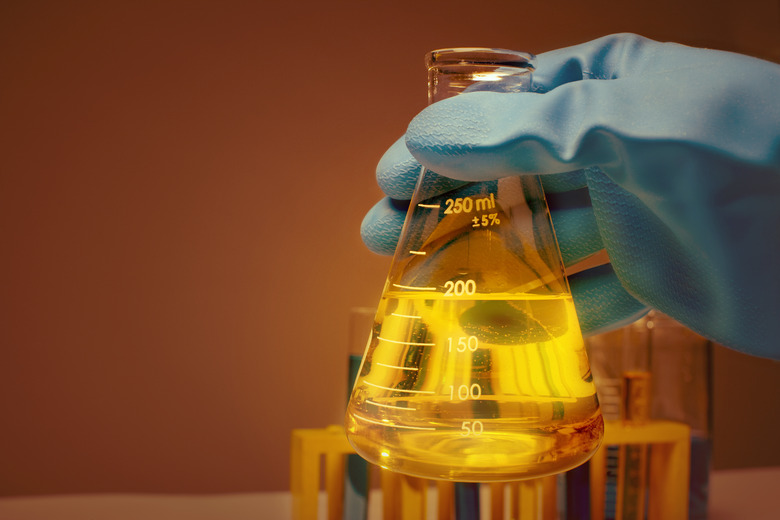How To Convert Gas From A Volume Percent To A Weight Percent
Volume percents characterize the composition of gas mixtures. An example of a gas mixture is air that consists of primarily oxygen and nitrogen gasses. Gas mixtures obey the ideal gas law that sets the relation between the gas volume, temperature and pressure. According to this law, the volume is proportional to the number of moles of a gas, and therefore, the mole percentage is the same as the volume percents for gas mixtures. Weight percents refer to mass of gasses in the mixtures and are required for stoichiometry calculations in chemistry.
1. Write Down The Chemical Composition
Write down the composition of the gas mixture. For example, the mixture consists of oxygen O2 and nitrogen N2, and their respective volume percents are 70 and 30.
2. Calculate the Molar Mass
Calculate the molar mass of the first gas in the mixture; in this example, the molar mass of oxygen, O2 is 2×16 = 32 grams per mole. Note that the atomic weight of oxygen is 16, and the number of the atoms in the molecule is 2.
3. Calculate the Second Molar Mass
Calculate the molar mass of the second gas in the mixture; in this example, the molar mass of nitrogen, N2 is 2× 4 = 28 grams per mole. Note that the atomic weight of nitrogen is 14, and the number of the atoms in the molecule is 2.
4. Divide to Get Weight
Divide the volume percent of the first gas by 100, and then multiply the respective molar mass to calculate the weight of the first gass in one mole of the mixture. In this example, the mass of the oxygen is:
\(\frac{70}{100}\times 32=22.4\text{ grams}\)
5. Find the Weight of the Second Gas
Divide the volume percent of the second gas by 100, and then multiply the respective molar mass to calculate the weight of the second gass in one mole of the mixture. In this example, the mass of the oxygen is:
\(\frac{30}{100}\times 28=8.4\text{ grams}\)
6. Add Up the Weights
Add up the weights of the gasses to compute the mass of one mole of the mixture. In this example, the mass of the mixture is 22.4 + 8.4 = 30.8 grams.
7. Calculate the First Weight Percent
Divide the weight of the first gas by the mass of the mixture, and then multiply by 100 to calculate the weight percent. In this example, the weight percent of oxygen is:
\(\frac{22.4}{30.8}\times 100 = 72.7\)
8. Calculate the Second Weight Percent
Divide the weight of the second gas by the mass of the mixture, and then multiply by 100 to calculate the weight percent. In this example, the weight percent of nitrogen is:
\(\frac{8.4}{30.8}\times 100 = 27.3\)
References
- "Chemistry"; Raymond Chang; 2007
- Wolfram: Ideal Gas Law
Cite This Article
MLA
Fox, Oxana. "How To Convert Gas From A Volume Percent To A Weight Percent" sciencing.com, https://www.sciencing.com/convert-volume-percent-weight-percent-8740558/. 8 November 2020.
APA
Fox, Oxana. (2020, November 8). How To Convert Gas From A Volume Percent To A Weight Percent. sciencing.com. Retrieved from https://www.sciencing.com/convert-volume-percent-weight-percent-8740558/
Chicago
Fox, Oxana. How To Convert Gas From A Volume Percent To A Weight Percent last modified March 24, 2022. https://www.sciencing.com/convert-volume-percent-weight-percent-8740558/
